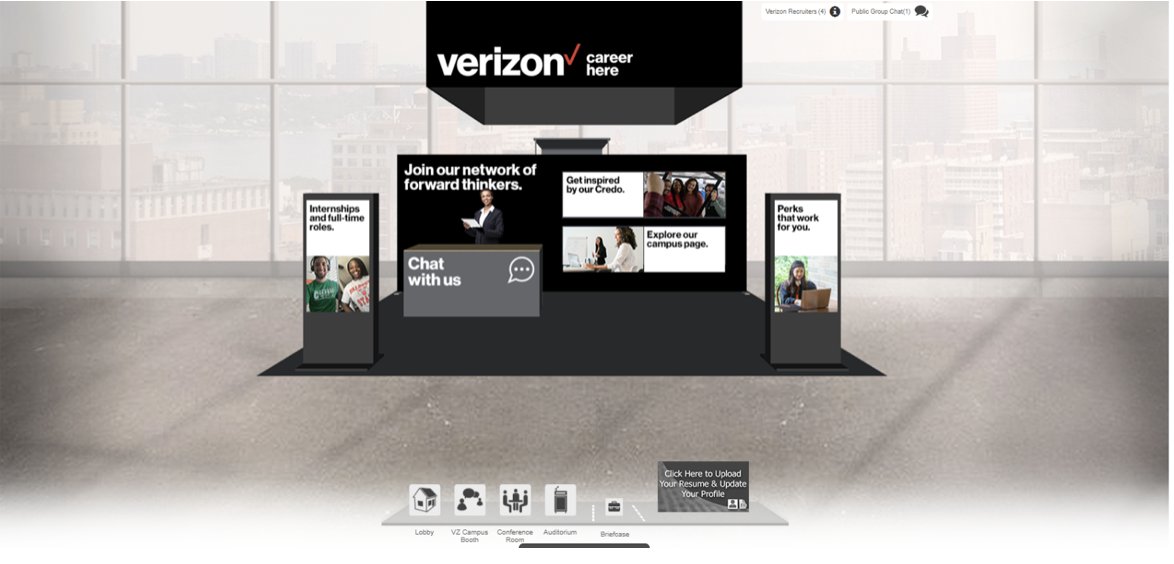How Verizon Created an Award-winning Virtual Internship Program
Last year, Verizon transformed its internship program to be fully remote. Here’s how they created a rewarding experience for students and managers.
Last year, Verizon transformed its internship program to be fully remote. Here’s how they created a rewarding experience for students and managers.

Stephanie Emma Pfeffer
Stephanie Emma Pfeffer is a sought-after storyteller for bestselling publications like People, Family Circle, Self, and New York Magazine.
In fall 2019, Verizon began selecting 450 talented students to join its 2020 summer internship program. By spring, most interns had accepted their on-site positions and were looking forward to onboarding a few months later. Then, the pandemic struck.
Christy Pambianchi, Verizon’s Chief Human Resources Officer, remembers making a tough decision. “When it became clear that there were still shelter-in-place orders and we were not returning to the office, we communicated to the interns that we would honor their offers—but it would be a virtual experience,” she says. “We couldn’t bring ourselves to renege on these kids.”
Internally, the idea was met with skepticism, especially around providing an enriching experience without interns physically present. “Part of our core offering—so we thought—was inviting our interns into our offices and giving them a full, real-world experience,” says Pambianchi. “We were unsure if we could engage them the same way virtually. I had to work hard to convince my boss.” But once the Verizon leadership team saw the full engagement strategy, she says, the skepticism quickly turned into excitement.
The company’s willingness to adapt paid off. Nearly every student participated in the the virtual internship, and Verizon won several awards for its fully remote program, including places on WayUp’s 2020 list of the Top 100 Internship Programs and RippleMatch’s 50 Companies That Put on Awesome Remote Internships.
Here’s how Verizon did it.
They Optimized the Environment
“We wanted to preserve a best-in-class experience for both our interns and our Verizon leaders,” says Laura Houde, Director of Talent Acquisition. To do that, Verizon launched a custom virtual event platform with Astound Virtual. For orientation, “we tried to generate the same type of interactions that students would have face-to-face, like being able to meet people at Verizon,” Houde says. Intern candidates were able to “see” headquarters and navigate to different chat rooms, where Verizon staffers facilitated discussions. “They were able to physically explore facilities that looked and felt real, and to connect with our team members—to look inside of Verizon and our culture,” she adds.

Verizon provided interns with necessary hardware, including laptops and headsets, and stipends as needed for interns’ cellphones, Wi-Fi, and hot spots. Prior to starting, interns received details on setting up their computer. On their first day, they had access to a tech support line, and IT staff held a webinar to answer questions.
After orientation, “we partnered with our data privacy and cybersecurity teams to present the dos and don’ts of working from home, as well as data privacy compliance,” says Houde. Examples of best practices included being cautious of email phishing, locking laptops when not in use, not downloading Verizon email on personal devices, and not working around smart-home devices that might be listening. “We trained managers on similar content to make sure they could manage interns remotely.”
They Fostered Camaraderie
To get interns excited about the program, Verizon asked executives to send self-recorded video testimonials using iCIMS, a cloud recruiting platform. During orientation, interns attended a companywide leadership webcast with CEO Hans Vestberg. “We partnered with our communications team to make sure that we were hosting live, interactive kickoff events,” Houde says. “We wanted to showcase not just our culture, but also who the executives are, so they could understand more about Verizon as a whole.” Former interns were asked to share their insights during a panel discussion with current interns, and social events, including a virtual talent show and trivia activities, were conducted via WebEx videoconferencing software.
Networking opportunities were reimagined, too. Because in-person coffee chats were not possible, Verizon arranged virtual coffee and lunch meetups. “We were able to provide the interns with access to many senior leaders—maybe ones they wouldn’t have had exposure to [if not for being virtual], so they could chat with them directly and get to know them on a personal level,” says Houde.
Pambianchi agrees that this was a major benefit to switching to a virtual program. “Every senior leadership team member interacted with the cohort,” she says. “It may have created more connectivity among the cohort than when it was on-site.”
They Built in Learning Opportunities
Another priority for Verizon was to remain true to the company’s key internship pillars, especially providing meaningful work. “We asked each hiring manager to ensure that they could offer a purposeful virtual assignment,” says Houde.
Once the program got underway, managers were advised to check in daily with their interns to align goals and deadlines. The Intern Program Experience team also answered questions on HR and tech topics, among others, during two optional office hours sessions.
To create a culture of learning, Verizon used a highly structured program. “We accounted not just for their project and manager engagement, but we also baked in leadership development, networking sessions, and business and functional acumen,” says Houde. Each day of the week featured a specific activity:
- Mondays: virtual networking
- Tuesdays: live or online training
- Wednesdays: HR webinars or department-related activities
- Thursdays: crew meetings
- Fridays: fun activities
HR webinars gave interns a closer look at Verizon’s culture, and teams talked about topics like 5G, diversity and inclusion, corporate responsibility, sustainability, and health and wellness.
They Broadened Recruiting Efforts
In the end, 99% of interns said they wanted to return to Verizon and were satisfied with the internship program, an increase from previous years, according to Houde. That success encouraged Verizon to keep their planned 350 interns virtual for summer 2021.
Whereas the recruiting they did for the 2020 cohort relied heavily on face-to-face interaction and in-person events, Verizon is working with universities to recreate the process virtually for the next group.
One major component of Verizon’s virtual recruitment initiative is its Brand Ambassador program. “We identified 28 core schools,” including historically black colleges and universities, says Houde. Although the Brand Ambassador program would have likely been implemented even if the internships had not gone virtual, it came at a convenient time. “We were increasing our relationships and communication with those schools, which was exactly what we needed to do.”
Interested internship candidates use the same application system as in previous years, via Verizon’s career page, which lists all open intern positions and shares insights from recent hires on their experiences. Most roles do not require a portfolio; for those that do, like in the marketing department, students show their work via their personal websites. Those selected for an interview will speak with hiring managers via BlueJeans videoconferencing.
Houde says the company plans to replicate last year’s success: In addition to being named to WayUp and RippleMatch’s best lists, Verizon was selected as a 2021 RippleMatch Campus Forward Honoree, specifically for its first virtual internship program’s success. “We stood out to them for the work we did on creating an inclusive process, our ability to adapt amid a pandemic, and our ability to preserve a strong candidate experience,” says Houde.
Pambiachi couldn’t be more satisfied with how things worked out. “From a crisis came an opportunity to reimagine our internship program and demonstrate our commitment to these interns who showed up eager and ready to contribute,” she says. Houde notes that they are reaching significantly more candidates, diversifying the talent pool, and democratizing who can apply because they’re no longer restrained by location. Adds Pambianchi, “It was another proof point that a distributed workforce is the way of the future and something that we can embrace even for our interns.”
